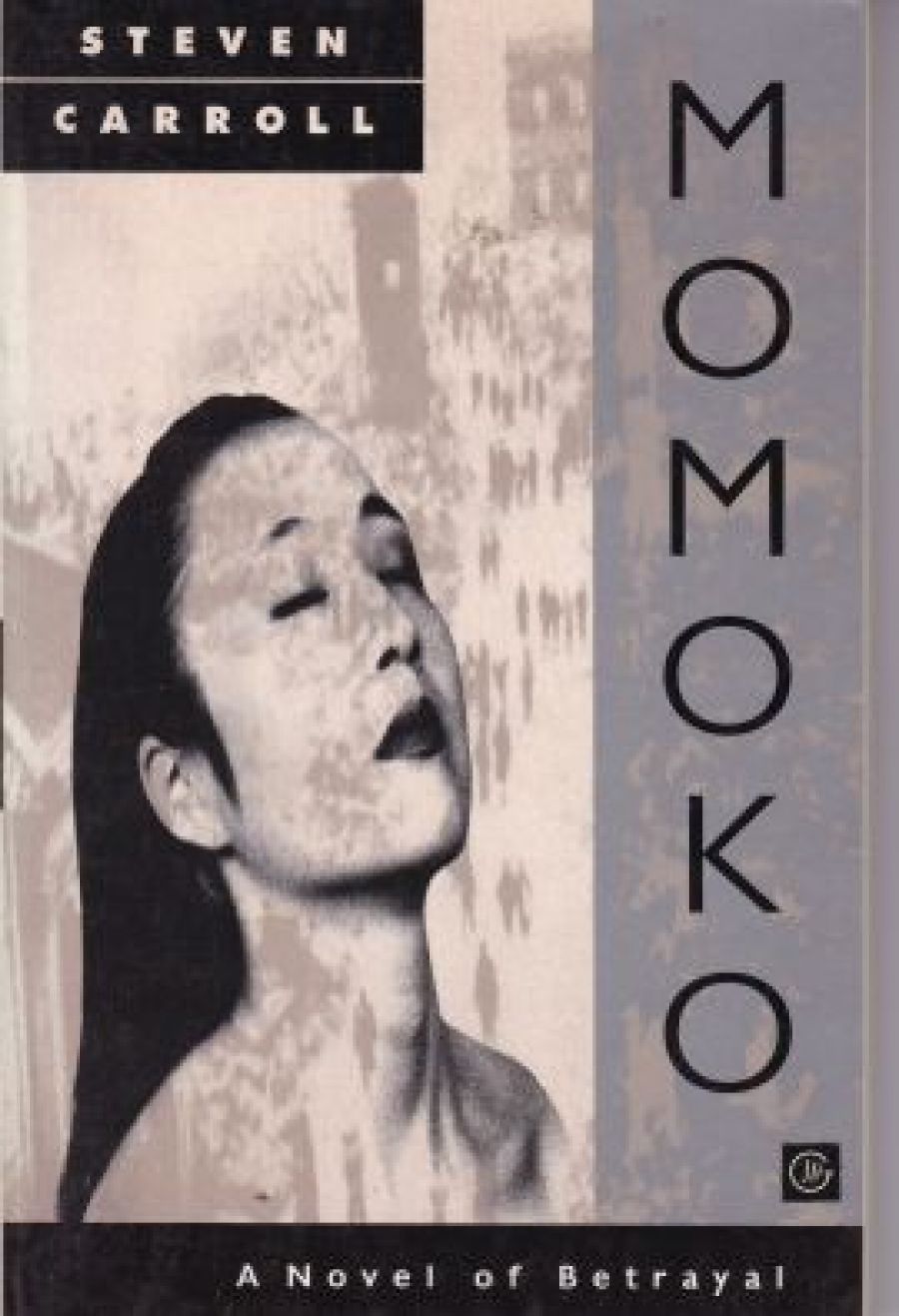
- Free Article: No
- Contents Category: Fiction
- Review Article: Yes
- Article Title: Men out of control
- Online Only: No
- Custom Highlight Text:
Is it possible for love to flourish between an oppressor and one who is oppressed? J.M. Coetzee, in his novel Waiting for the Barbarians, thought not, but Coetzee provided some compensation for his hero by ennobling him to an almost mythical degree in order to present the argument that power can be used equally to fight injustice and brutality, or to inflict it. The main character in Coetzee’s novel, the Magistrate, recognises the pathology inherent in his love for a captured ‘barbarian’, and chooses to return her to her·people. He then becomes a victim himself as he fights the atrocities being perpetrated around him.
- Book 1 Title: Momoko
- Book 1 Subtitle: A novel of betrayal
- Book 1 Biblio: McPhee Gribble, $14.95 pb
Steven Carroll is not so kind to the protagonist of his novel, Momoko. Allen ‘Spin’ Bowler – young Australian literary academic and linguist who is excessively sensitive and timid – finds himself in Japan after the Second World War, a member of the Allied occupying forces, working as an interpreter and translator. Spin believes that his understanding of Japanese people and culture is superior to that of his associates, who view the Japanese as devious and alien.
Spin is drawn into a love affair with a Japanese woman, who has spent much of her youth in England. This love seems to him to be a logical and fortuitous extension of his love of oriental culture. The imbalance of power between Spin and Momoko is initially disregarded by them both.
Similarly, Momoko finds in Spin a potential liberation, not from occupied Japan, but from those aspects of her culture that she finds oppressive. A parallel is drawn here with the character Naomi from Tanizaki Junichuro’s famous and important novel, A Fool’s Love. This allusion has multiple points of reference with Carroll’s novel.
The assumption of equality in Spin and Momoko’s relationship is soon challenged. Momoko is confronted by a conflict of loyalty, coming to her in the form of a former lover’s need for friendship and support as he grapples with the demons in his head, the aftermath of his involvement in the war as a Japanese soldier in Burma. Momoko finds herself unable to tell Spin about this part of her life, because, although it is innocent in a sexual sense, politically it is not; and she understands that Spin is simultaneously both her lover and a member of the occupying forces.
Spin’s first inklings of Momoko’s other life erupt into a distressing incident of sexual bullying. He then seeks and ‘finds’ evidence of her infidelity, and confronts her in a sordid show of power. The illusion of a love match of equals, of freedom of action between a captor and a captive, is shattered. Perhaps the real tragedy in this novel is that Carroll does not allow Spin to salvage even a hint of self-respect from this episode, let alone the nobility of spirit Coetzee’s Magistrate is allowed. While this novel concentrates on Spin’s path to self-knowledge, Carroll’s sympathies lie with those he recognises as the victims of the story – Momoko, her former lover and those he perceives as the Japanese people.
This authorial alliance is consistent with views expressed in Carroll’s first novel, Remember Me, Jimmy James. Carroll is critical of Australian (or, more generally, Western) men, portraying them as emotionally and psychologically repressed, irresponsible, and inclined to either self-loathing or misogyny. This bleak view carries an implied sense that men are victims of a cultural and social environment within which they can act, but over which they have no fundamental control. Nor, according to Carroll, is there any obvious way out.
The allusion to Tanizaki’s novel, A Fool’s Love, provides an interesting dimension to Momoko. When A Fool’s Love was published in Japan in the 1920s its main female character, Naomi, became a symbol of the modernisation of Japan, particularly with respect to Japanese women.
The irony is that Tanizaki appears to have used the novel to criticise his own long-standing interest in the Westernisation of Japan, and in the later years of his life he embraced traditional Japanese values. The irony of this reference to Naomi is presumably appreciated by Carroll, who seems to share other interests with Tanizaki, including the transference of historical and political themes to a sexual level. Both authors have also created male anti-heroes with a masochistic or pathological attraction to cultures not their own.
Woven throughout Momoko is another pessimistic theme: the inability of literature to educate or ennoble its devotees. Literature is the young Spin’s passion, but after his affair with Momoko it becomes something to escape into.
The writing in this novel is not exceptional, but in its brief length this book raises a number of ethical, psychological and literary issues with great subtlety, and it is arguably a more honest and accurate portrayal of oppression than that presented by Coetzee.


Comments powered by CComment